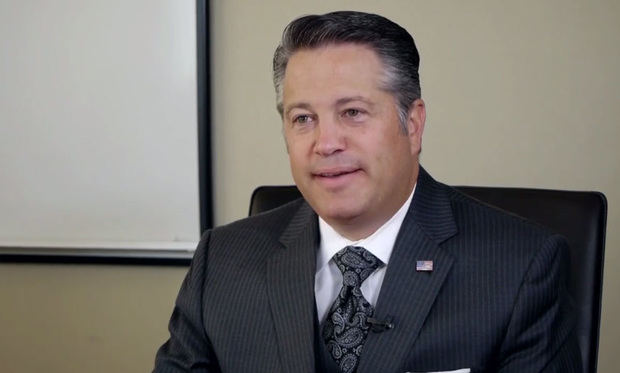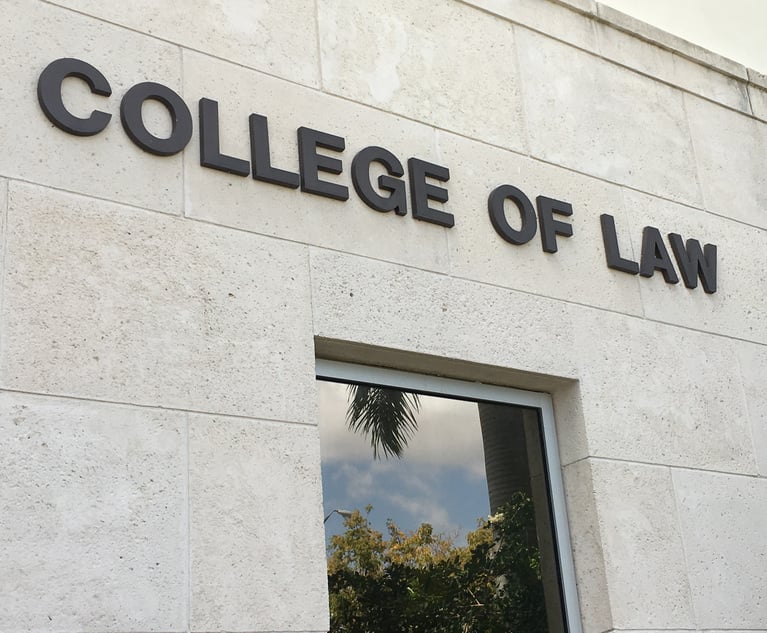State Lawmaker LaMarca Critical of NCAA Compensation Plan
Rep. Chip LaMarca tweeted that the framework backed by the NCAA Board of Governors was encouraging, but "more substantive action is needed, and quickly to achieve justice for college athletes."
May 01, 2020 at 02:26 PM
4 minute read
 Rep. Chip LaMarca/courtesy photo
Rep. Chip LaMarca/courtesy photo
Recommendations backed by NCAA leaders to help college athletes earn money off the field won't help many students, contends a Florida lawmaker who was an architect of a bill this year to let athletes market themselves.
State Rep. Chip LaMarca, R-Lighthouse Point, initially tweeted Wednesday that the framework backed by the NCAA Board of Governors was encouraging, but "more substantive action is needed, and quickly to achieve justice for college athletes."
But LaMarca, who helped sponsor an athlete-compensation bill (SB 646) approved in March by the Legislature, later issued a news release saying the support given by the NCAA's top governing body is "about protecting their pockets, not about student athletes."
The NCAA proposal awaits feedback from schools, with a formal proposal expected by October and a final vote by the board by January.
State Sen. Debbie Mayfield, a Rockledge Republican who also led efforts to pass the athlete-compensation bill this year, was more supportive of the NCAA action.
"A step in the right direction from the @NCAA," Mayfield tweeted. "College athletes across the country should have the opportunity to receive reasonable compensation from the use of their likeness, image or name."
The NCAA plan would allow college to receive compensation for third-party endorsements related to and separate from athletics, according to a news release from the organization. It also supports compensation through such things as social media, personal appearances and businesses that athletes start.
"Allowing promotions and third-party endorsements is uncharted territory," Michael Drake, the NCAA board chairman and president of Ohio State University, said in a statement.
The NCAA release said athletes could appear in advertisements and refer to their sports and schools, but they couldn't use school logos in ads.
ESPN reported the recommendations leave "room for the NCAA and schools to regulate the types of deals athletes might be allowed to sign in the future and the monetary value of individual contracts."
LaMarca said the recommendations don't meet the proposed changes approved by the Legislature. The bill, which still needs Gov. Ron DeSantis' signature, would not take effect until July 1, 2021, with the delay designed to give the NCAA time to make its own changes.
"The recommendations today included backtracking on group licensing, which would be allowed under SB 646," LaMarca said in his statement. "Another recommendation from the NCAA includes potentially regulating sneaker and apparel companies from entering into third-party advertising agreements with collegiate athletes."
Florida's bill would establish rights for students and schools.
Students would be allowed to get professional representation through agents licensed by the state or attorneys in good standing with The Florida Bar.
Colleges and universities would be prohibited from putting restrictions on athletes earning outside compensation or receiving professional representation. Schools wouldn't be able to revoke or reduce scholarships of athletes who earn off-field pay.
The bill would prohibit college athletes from making personal deals that conflict with the terms of team contracts.
Florida's bill was spurred by a 2019 California law that will allow college athletes in that state to hire agents and sign endorsement deals starting in 2023. DeSantis, a former college baseball player, is expected to sign the bill.
"When Florida Governor Ron DeSantis signs SB 646, Florida's collegiate athletes will be liberated from these restrictions," LaMarca said. "But every student athlete across the 50 states should be able to earn from their talent. If the third largest state can do it, then so can this collegiate organization. With a global pandemic challenging our economy, now more than ever students must have the flexibility to continue their education and provide for themselves and their families."
LaMarca pointed to a recent study from the Hope Center for College, Community and Justice at Temple University that found up to 19% of college athletes suffer from homelessness and 24% struggle with food insecurity.
"This picture does not reflect the utopian vision that the NCAA would have you believe exists in college sports today," LaMarca said.
Jim Turner reports for the News Service of Florida.
This content has been archived. It is available through our partners, LexisNexis® and Bloomberg Law.
To view this content, please continue to their sites.
Not a Lexis Subscriber?
Subscribe Now
Not a Bloomberg Law Subscriber?
Subscribe Now
NOT FOR REPRINT
© 2025 ALM Global, LLC, All Rights Reserved. Request academic re-use from www.copyright.com. All other uses, submit a request to [email protected]. For more information visit Asset & Logo Licensing.
You Might Like
View All
Florida Law Schools Are Seeing a Bump in Applications for 2025, After Recent Declines at Flagship Schools
3 minute read
LSU General Counsel Quits Amid Fracas Over First Amendment Rights of Law Professor
7 minute read
Second DCA Greenlights USF Class Certification on COVID-19 College Tuition Refunds
3 minute read
Trending Stories
- 1RIP DOJ FCPA Corporate Prosecutions
- 2Federal Trade Commission’s Updates to the Health Breach Notification Rule Now In Effect
- 3I’m A Lawyer, What Can I Sell?
- 4Internal GC Hires Rebounded in '24, but Companies Still Drawn to Outside Candidates
- 5How I Made Office Managing Partner: 'Don’t Be an Opportunity Killer,' Says Thomas Haskins of Barnes & Thornburg
Who Got The Work
J. Brugh Lower of Gibbons has entered an appearance for industrial equipment supplier Devco Corporation in a pending trademark infringement lawsuit. The suit, accusing the defendant of selling knock-off Graco products, was filed Dec. 18 in New Jersey District Court by Rivkin Radler on behalf of Graco Inc. and Graco Minnesota. The case, assigned to U.S. District Judge Zahid N. Quraishi, is 3:24-cv-11294, Graco Inc. et al v. Devco Corporation.
Who Got The Work
Rebecca Maller-Stein and Kent A. Yalowitz of Arnold & Porter Kaye Scholer have entered their appearances for Hanaco Venture Capital and its executives, Lior Prosor and David Frankel, in a pending securities lawsuit. The action, filed on Dec. 24 in New York Southern District Court by Zell, Aron & Co. on behalf of Goldeneye Advisors, accuses the defendants of negligently and fraudulently managing the plaintiff's $1 million investment. The case, assigned to U.S. District Judge Vernon S. Broderick, is 1:24-cv-09918, Goldeneye Advisors, LLC v. Hanaco Venture Capital, Ltd. et al.
Who Got The Work
Attorneys from A&O Shearman has stepped in as defense counsel for Toronto-Dominion Bank and other defendants in a pending securities class action. The suit, filed Dec. 11 in New York Southern District Court by Bleichmar Fonti & Auld, accuses the defendants of concealing the bank's 'pervasive' deficiencies in regards to its compliance with the Bank Secrecy Act and the quality of its anti-money laundering controls. The case, assigned to U.S. District Judge Arun Subramanian, is 1:24-cv-09445, Gonzalez v. The Toronto-Dominion Bank et al.
Who Got The Work
Crown Castle International, a Pennsylvania company providing shared communications infrastructure, has turned to Luke D. Wolf of Gordon Rees Scully Mansukhani to fend off a pending breach-of-contract lawsuit. The court action, filed Nov. 25 in Michigan Eastern District Court by Hooper Hathaway PC on behalf of The Town Residences LLC, accuses Crown Castle of failing to transfer approximately $30,000 in utility payments from T-Mobile in breach of a roof-top lease and assignment agreement. The case, assigned to U.S. District Judge Susan K. Declercq, is 2:24-cv-13131, The Town Residences LLC v. T-Mobile US, Inc. et al.
Who Got The Work
Wilfred P. Coronato and Daniel M. Schwartz of McCarter & English have stepped in as defense counsel to Electrolux Home Products Inc. in a pending product liability lawsuit. The court action, filed Nov. 26 in New York Eastern District Court by Poulos Lopiccolo PC and Nagel Rice LLP on behalf of David Stern, alleges that the defendant's refrigerators’ drawers and shelving repeatedly break and fall apart within months after purchase. The case, assigned to U.S. District Judge Joan M. Azrack, is 2:24-cv-08204, Stern v. Electrolux Home Products, Inc.
Featured Firms
Law Offices of Gary Martin Hays & Associates, P.C.
(470) 294-1674
Law Offices of Mark E. Salomone
(857) 444-6468
Smith & Hassler
(713) 739-1250






